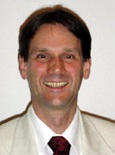Life
Christoph Scherrer studied economics and American studies at the University of Frankfurt, where he also received his PhD in political science in 1989. From 1990–1998, he was an assistant professor at the J.F. Kennedy-Institute of the Free University Berlin. During this time, he was a guest professor at Rutgers University in Newark, a visiting fellow in the Department of Political Science at Yale University, held a J.F. Kennedy-Memorial Fellowship at Harvard University [2] and was a Hewlett Scholar at the John E. Andrus Center for Public Affairs at Wesleyan University, Middletown, CT.
After obtaining his habilitation in 1999, he became a visiting professor of European politics at the Berlin School of Economics and a visiting professor at the University of Kassel. Since 2000, he has been a full professor of "Globalization & Politics" at the University of Kassel. Since then he has also held posts as a visiting fellow at YCIAS-Yale University, visiting professor at the Universidad Autónoma de Yucatán, visiting scholar at the International Labour Organization, visiting professor at the Tata Institute of Social Sciences in Mumbai and senior fellow at the Center for Post-Growth Societies, University of Jena. [3] Currently, Scherrer directs two English-language Master programs: MA Global Political Economy (GPE) and Labour Policies and Globalization (LPG). He is the Executive Director of the International Center for Development and Decent Work (ICDD), an awarded center of excellence in development cooperation, Co-Director of the Böckler/Böll funded PhD program "Global Social Policies and Governance" and a member of the Steering Committee of the Global Labour University. He is laureate of the "Excellence in Teaching" prize of the state of Hessen, 2007. [4]
This page is based on this
Wikipedia article Text is available under the
CC BY-SA 4.0 license; additional terms may apply.
Images, videos and audio are available under their respective licenses.
